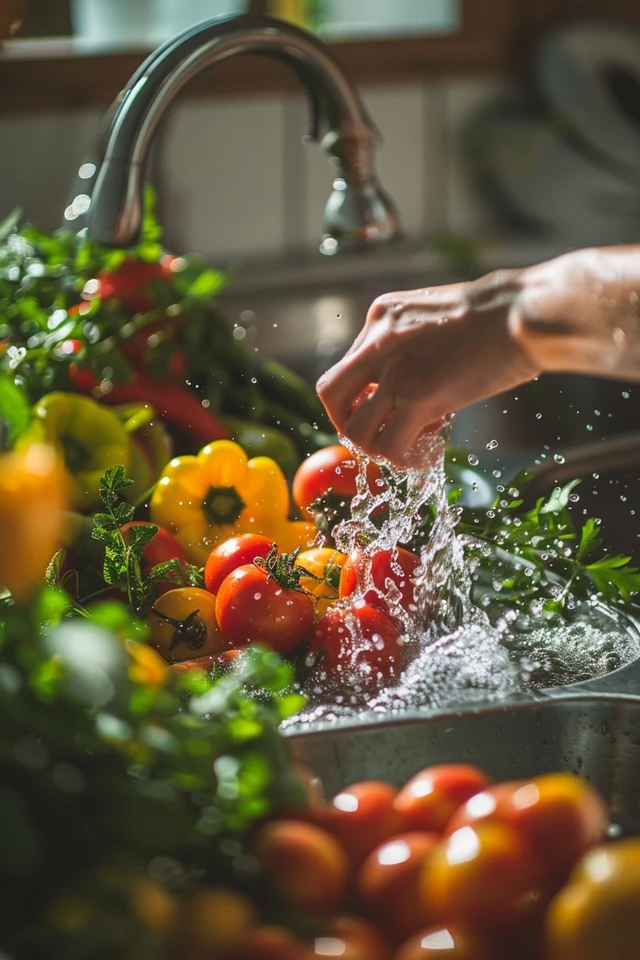When it comes to enjoying freshly harvested vegetables, ensuring that they are clean and free from any residue is essential. This is particularly true if you have used neem oil, a natural and effective solution for controlling pests and diseases in your garden. Neem oil can leave a residue on vegetables, and it is important to know how to properly wash it off to ensure the safety of your produce.
To remove neem oil residue from your vegetables, start by filling a bowl with warm, soapy water. Submerge the vegetables in the water and let them soak for 1-2 minutes. This will help loosen any residue clinging to the surface. Then, gently scrub the vegetables with a clean sponge to further remove the neem oil. Be thorough but gentle to avoid damaging the vegetables.
After scrubbing, rinse the vegetables under running water to ensure that all soap residues and neem oil are completely washed away. The running water helps flush out any remaining residue, leaving your vegetables clean and ready to be cooked or consumed. For an extra crisp texture, you can also soak the vegetables in cold water for a few minutes before rinsing.
It is important to note that vegetables should ideally be picked 5-7 days after they have been sprayed with neem oil to allow the oil to break down naturally. However, if you need to harvest them sooner, following these washing techniques will help ensure that they are safe to eat.
Key Takeaways:
- Neem oil can leave a residue on vegetables, and it is important to properly wash it off.
- Start by soaking the vegetables in warm, soapy water for 1-2 minutes.
- Gently scrub the vegetables with a clean sponge to remove any neem oil residue.
- Rinse the vegetables thoroughly under running water to ensure all soap and neem oil are washed away.
- Soaking the vegetables in cold water can help achieve a crisp texture.

Neem Oil: Benefits and Concerns
Neem oil is derived from the neem tree and has been used for centuries for various purposes. It is considered an environmentally friendly way to eliminate garden pests on indoor and outdoor plants. Neem oil is safe to use on all types of plants, including vegetables and herbs. It can control soft-bodied pests such as aphids, mealybugs, and whiteflies, as well as fungal diseases like powdery mildew and blackspot.
“Using neem oil for pest control is a natural and effective solution for maintaining healthy plants.”
However, neem oil should be used correctly to avoid any harmful effects. Different neem oil products are available, including ready-to-use sprays and concentrate formulations. It is important to read the product label carefully to choose the right product for your specific pest problem. Neem oil should be applied to plants when pests are present, and all parts of the plant, including the undersides of leaves, should be thoroughly sprayed.
It is recommended to apply neem oil in the early morning or late evening to minimize harm to beneficial insects. Neem oil takes time to work, and multiple applications may be necessary for complete pest control.

Benefits of Neem Oil:
- Environmentally friendly pest control solution
- Effective against various pests and fungal diseases
- Safe for use on all types of plants, including vegetables and herbs
Concerns and Safety:
- Neem oil may cause allergic reactions in some individuals, so it’s important to test it on a small area before applying it to larger surfaces.
- As with any pesticide, it is important to follow the instructions on the product label and avoid overuse.
- While neem oil is generally safe for humans and pets when used correctly, ingestion of large quantities can cause gastrointestinal distress.
- Neem oil should be stored in a cool, dry place, away from children and pets.
By understanding the benefits and concerns associated with neem oil, you can effectively utilize it for pest control and plant health while ensuring the safety of yourself and your environment.

Conclusion
Ensuring the safety of our vegetables and eliminating any residue from neem oil is crucial for a healthy and worry-free meal. By following safe washing techniques for neem oil, we can effectively remove any potential residue and pests from our produce. The recommended method includes soaking the vegetables in warm, soapy water for a few minutes to loosen the oil. Gently scrubbing the vegetables with a clean sponge and rinsing them thoroughly under running water helps to wash away any remaining oil and soap residues.
It is advisable to wait for at least 5-7 days after spraying neem oil before harvesting the vegetables. This allows the neem oil to break down naturally and ensures that it is no longer present on the produce. Neem oil is generally safe to use on vegetables, but it is essential to apply it carefully to avoid any damage to the plants.
Additionally, being aware of the potential health effects and toxicity of neem oil is important. Although neem oil is relatively safe for humans when used correctly, it is always wise to take precautionary measures and handle it responsibly. By following effective vegetable cleaning methods specifically designed for neem oil residue safety, we can enjoy chemical-free produce and have peace of mind knowing that our meals are safe and healthy.

